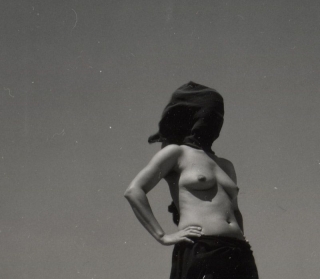Date: 19 May 2006 | Season: Wilhelm Hein
YOU KILLED THE UNDERGROUND FILM
Friday 19 May 2006, at 7:30pm
London The Horse Hospital
“Wilhelm Hein: Perfekt!” begins with a screening (at the Horse Hospital) of his recent epic, You Killed The Underground Film, or The Real Meaning of Kunst Bleibt, Bleibt. An open-ended work, it gathers a decade of footage in a diaristic odyssey that slides from the sublime to the ridiculous, between document and performance.
Hein faces his own history in the climate of political change that has transformed Europe since the 1980s, mixing images with diverse music and spoken word recordings. Jack Smith, Nick Zedd and other underground figures appear in the film, which transcends nostalgia to become a pure and progressive affirmation of independence. Defiant, didactic and polemical, this sprawling opus is a kick in the teeth for convention. (Against all odds, it won the German Critics Prize at last year’s European Media Art Festival, Osnabrück.)
Wilhelm Hein, You Killed The Underground Film, or The Real Meaning of Kunst Bleibt, Bleibt Germany, 2002-06, b/w & colour, sound-on-cd, 120 min
“Wilhelm Hein’s new film is a fascinating and challenging example of what it means to make politically relevant underground film in an increasingly rented world.” (Marc Siegel)
Curated by Mark Webber for Goethe-Institut London.
WILHELM HEIN: PERFEKT! continues at the Goethe Institute (South Kensington) on Saturday 20 May. 4pm: Wilhelm Hein & Malcolm Le Grice screening and informal discussion on Materialist filmmaking in the 60s & 70s. 7:30pm: Wilhelm Hein’s Secret Cabinet including films by Andy Warhol, Kurt Kren, Dieter Roth, Tony Conrad, Peter Weibel, Viennese Aktionists Gunther Brus and Otto Muehl, and from the German underground: Annette Frick, Die Tödliche Doris and Lukas Schmied.
PROGRAMME NOTES
YOU KILLED THE UNDERGROUND FILM
Friday 19 May 2006, at 7:30pm
London The Horse Hospital
Wilhelm Hein, punk pioneer of the German underground, presents You Killed The Underground Film, or The Real Meaning of Kunst Bleibt, Bleibt, a diaristic odyssey that slides from the sublime to the ridiculous, between document and performance. Jack Smith, Nick Zedd and others appear in the film, which transcends nostalgia to become a pure and progressive affirmation of independence. Defiant, didactic and polemical, this sprawling opus is a kick in the teeth for convention.
Hein began filmmaking in the 1960s, with rough collages that were audio-visual assaults on the senses. A true radical, who has resisted become part of the establishment, Wilhelm Hein remains committed to the underground and maintains a subversive practice dedicated to the freedom of expression.
YOU KILLED THE UNDERGROUND FILM, OR THE REAL MEANING OF KUNST BLEIBT, BLEIBT
Wilhelm Hein, Germany, 2002-06, b/w & colour, sound-on-cd, 120 min
“Assembled from over 10 years of footage he shot and collected, Wilhelm Hein’s new film is a fascinating and challenging example of what it means to make politically relevant underground film in an increasingly rented world. The film’s title is partly taken from a text of a performance by Jack Smith at the 1974 Cologne Art Fair that Hein documented and uses here in the film’s prologue. On the soundtrack we hear Smith’s familiar, almost comforting, nasaldrone bemoaning museums, the art market and artists whose images suck the life out of their subjects, and the thinning of art. Images of Hein next to various public sculptures and monuments in Poland, the Ukraine, and Russia accompany parts of Smith’s rant. In this sequence, as in many others (for instance, the witty nod to Andrew Warhola set in Warsaw and scored with A Night In Tunisia), Hein’s unexpected combination of sound and image, of references and citations, calls to mind what might be one of the film’s central concerns: what can underground film tell us about the changes in Eastern Europe over the past 15 years? Hein’s révue-like film demonstrates the relevance of asking the question while offering numerous ways of answering it. The film functions as a burlesque show of aesthetic strategies and possibilities, invoking either directly or indirectly a mix of Hein’s favourites, including Marcel Duchamp, George Grosz, Nick Zedd, Arnold Schoenberg, Derek Jarman, Kurt Kren, Jerry Tartaglia, Samuel Beckett, Pete Seeger, Jack Smith, Andy Warhol and many more. Hein never slips into a mode of irony or cynicism while poignantly and beautifully juxtaposing an earnest humanitarian Michael Jackson song with some re-edited Japanese porn. With his sexy, playful and contemplative film, Hein asks of the underground what Jack Smith asked of Maria Montez: give socialist answers to a rented world!” (Marc Siegel)
Back to top
